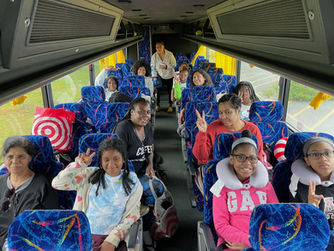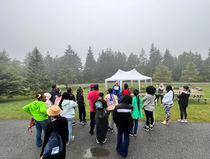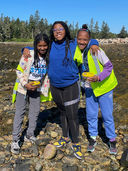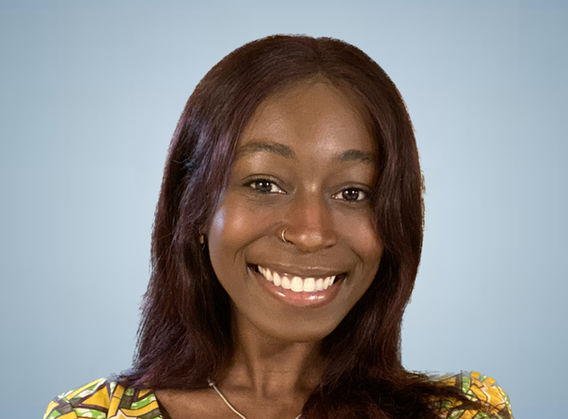
We need to give girls of color a solid foundation in the sciences, and we need to start early.
By middle school it's too late!
If we want to improve equity in science education and close the STEM gap, we must increase access to programs which generate the passion needed to lead young girls into STEM careers.
The Issues
Short-term exposure to STEAM activities, especially for girls of color, is not enough to drive a sustained passion for the sciences. They need access to multi-year programming to reach the desired outcome (Clewell & Darke, 2000).
Access to enrichment programming in many communities is insufficient. For every child enrolled in an afterschool program, there are 3 more waiting to get in (America After 3PM, 2022).
Girls who like STEAM in 3rd grade often lose interest by 5th grade due to gender stereotypes and a lack of confidence in advanced science and math classes (Microsoft, 2017).
Access to role models has been shown to increase interest in STEM careers, yet 64% of girls say they've never met a woman in a STEM profession. (Microsoft, 2018)
Our 3-Year STEAM Program

Year 1
In their first year, students climb through the layers of the rainforest, dive into the depths of our oceans, and travel to the most extreme places on planet earth.
By the end of their first year, using geological, biological, and anthropological lenses, students can explain why different ecosystems exist, what makes a healthy habitat, and how animals adapt so they can thrive in some of the harshest environments across the planet.

Year 2
In their second year, students continue to examine the dynamic nature of planet Earth. They learn about Earth's past and present, conduct investigations, and make inferences about the future by studying the work of paleontologists, climatologists, and astronomers.
By the end of their 2nd year, students can explain how Earth's history is connected to its present and can help guide predictions for its future.
.jpeg)
Year 3
Our Introduction to AI program allows students to delve into the fundamentals of artificial intelligence. Students will explore the basics of AI, including machine learning, robotics, and ethical considerations in technology.
By the end of this year, students will grasp how AI impacts their lives and the potential it holds for the future. They will learn how to utilize AI concepts to solve real-world problems while enhancing critical-thinking skills and innovation.
Alumni Program
Our alumni program provides continued support for our graduates as they move through middle and high school. We want to ensure that the seeds planted during their time with us continue to flourish through participation in future STEM activities.
-
Special events and field trips specific to our graduates
-
Continued participation in our guest speaker series
-
Access to a robust database of local STEM/STEAM programming available to them
-
Annual surveys tracking program participation, relevant coursework, and attitudes towards STEM.
-
Opportunities to return as a mentor for our online programs.
College Mentor Program
For each of our online cohorts, a college-aged mentor assists our teachers during classes. Our mentors are typically majoring in, or earning a masters degree in, elementary education or a STEM topic. Our mentors work directly with students and help lead portions of each class. They also assist students who need more attention or are struggling with a concept, to ensure that they don’t fall behind their classmates. Our mentors act as role models for our students, which is a vital part of helping young girls see their future selves. We believe that our mentors will have a lasting positive impact on our students’ future endeavors.
A Virtuous Cycle
While our college mentors act as role models for our FSF students, our VP of Education and our teaching staff act as mentors for our college students. They help them hone their teaching skills, develop a deeper understanding of STEAM pedagogy, and offer career advice. When it comes to the young girls who are currently in our programs, it is our hope that one day, some of them will return to our program as college students and become our next generation of mentors thereby closing the loop on this virtuous cycle.
Professional Development Program
.jpeg)
Finding highly trained teachers with STEAM experience has become much more challenging.
-
Most elementary school teachers are prepared as generalists, and often lack the disciplinary core and pedagogical approaches best suited for teaching elementary science (Lee & Glass, 2019).
-
Our Professional Development (PD) program is designed to increase elementary teachers’ science content knowledge, self-efficacy, and pedagogical understandings to facilitate effective science learning experiences.
-
PD programs will support FSF's expansion, and allow our teachers to apply what they've learned back in their own classrooms, thereby multiplying the impact of this program on many more students.
-
We hope to open our PD program to other STEAM organizations and educators who wish to improve their teaching skills, allowing us an opportunity to monetize the program and reach even more STEAM teachers.












